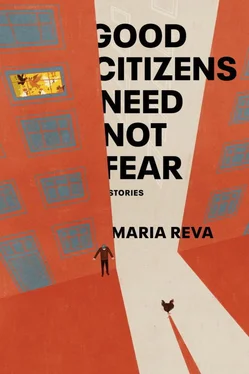Maria Reva - Good Citizens Need Not Fear - Stories
Здесь есть возможность читать онлайн «Maria Reva - Good Citizens Need Not Fear - Stories» весь текст электронной книги совершенно бесплатно (целиком полную версию без сокращений). В некоторых случаях можно слушать аудио, скачать через торрент в формате fb2 и присутствует краткое содержание. Город: New York, Год выпуска: 2020, ISBN: 2020, Издательство: Doubleday, Жанр: Современная проза, humor_satire, на английском языке. Описание произведения, (предисловие) а так же отзывы посетителей доступны на портале библиотеки ЛибКат.
- Название:Good Citizens Need Not Fear: Stories
- Автор:
- Издательство:Doubleday
- Жанр:
- Год:2020
- Город:New York
- ISBN:978-0-38554-529-7
- Рейтинг книги:3 / 5. Голосов: 1
-
Избранное:Добавить в избранное
- Отзывы:
-
Ваша оценка:
- 60
- 1
- 2
- 3
- 4
- 5
Good Citizens Need Not Fear: Stories: краткое содержание, описание и аннотация
Предлагаем к чтению аннотацию, описание, краткое содержание или предисловие (зависит от того, что написал сам автор книги «Good Citizens Need Not Fear: Stories»). Если вы не нашли необходимую информацию о книге — напишите в комментариях, мы постараемся отыскать её.
Good Citizens Need Not Fear: Stories — читать онлайн бесплатно полную книгу (весь текст) целиком
Ниже представлен текст книги, разбитый по страницам. Система сохранения места последней прочитанной страницы, позволяет с удобством читать онлайн бесплатно книгу «Good Citizens Need Not Fear: Stories», без необходимости каждый раз заново искать на чём Вы остановились. Поставьте закладку, и сможете в любой момент перейти на страницу, на которой закончили чтение.
Интервал:
Закладка:
Smena swung her door open, and stepped over the threshold. The exterior corridor was cold, dimly lit, smelled of stale tobacco. The damp climbed her calves and thighs, made her shiver in her coat. She wanted to turn around, banish the hostile world with a flick of the dead bolt. But her apartment had lost the protection it once held.
Taking the elevator was out of the question. Clutching the rickety metal banister, Smena descended one step at a time. She tried not to look at the cracks in the walls. A piece of candy perched on a stair and she reached for it before thinking, hungry, but the puffy wrapper was hollow inside, a child’s trick. The entranceway at the ground floor greeted her with the stench of garbage and urine, a waft of boiled potatoes.
Smena stepped outside and, for the first time in more than a year, felt live air move across her face. Her windows and glassed-in balcony had been sealed against drafts—she’d forgotten that drafts could feel nice, like a gentle tickling. She parted her lips, let the warm autumn light fill the cavity of her mouth and throat.
“I’ll be damned! She’s alive,” exclaimed one of the pensioners on the bench outside. The man had acquired a new sprinkling of moles and sun spots on his face since the last time she’d seen him. “How long’s it been, Smena Timofeevna?”
“Too long, Palashkin,” she answered.
She shuffled on, her feet unsteady on the cracked slabs of the sidewalk. The concrete ten-stories around her were identical to the one she had just exited, and Smena had the impression she was walking the same block over and over. She kept her eyes on the ground. She stepped on a curled dry leaf and its crunch underfoot delighted her. She stepped on another, then another, progressing leaf to leaf. Parts of the roads sagged. The edge of the town, where the sunflowers normally grew, was being closed in by cattails. Let it all sink, she thought. She imagined herself and the townspeople on the bottom of a great marsh, to be discovered centuries later, open-eyed, their skin blue, hair orange from the gases, preserved for eternity.
The next time she looked up, she stood in front of the building she thought might be the polyclinic. The gleaming white-tiled edifice in her memory cowered under the poplars, its walls matte with graffiti, many of the tiles missing.
Inside, wooden benches lined the walls of a small lobby. A nurse pushed a mop around the floor, transferring dirty water from one corner of the room to another. It didn’t take long to find Nika, who lay on a wheeled bed in a corridor off the lobby. The two paramedics who had collected her were arguing with the receptionist. As Smena approached Nika, the expression on her neighbor’s face transformed from happy surprise to terror. By the time Smena reached her bed, Nika had lifted the covers over her nose, as though expecting to be hit.
Smena stepped back. She’d been feared before, certainly—by Milena and Larissa, whenever she chastised them for an oversight—but not like this. It stung. “You can move your face again,” she observed, attempting a level tone.
“Now it’s my feet.”
“Where’s your son and the rest of them?”
“Work, the park, and the belly,” said Nika. “But you came.” It sounded like a question, Nika wondering aloud which version of Smena had come: the vengeful or the forgiving one. Smena still wasn’t sure herself.
“So they’re finally admitting you,” said Smena.
Nika nodded at the men and receptionist yelling at each other. “To be decided.” She lowered the cover from her face. The skull with which Smena had become so well acquainted shone under Nika’s pale, cracked skin, its outline disturbingly visible, now in three dimensions.
Nika gave a nervous laugh. “This is a bed, Smena. Look at it. It doesn’t fold into anything. It’s not a couch or a desk or a storage box. It’s a bed and you don’t feel bad lying in it. Try it.”
“What?”
“This bed. You’re going to try this bed.” Nika pushed her head and shoulders into her pillow, wriggled the rest of her body toward the rail at the edge of the bed. Smena thought Nika was playing a joke until a pale leg poked out from under the sheets and draped itself over the rail.
“No, Nika—” She grabbed Nika’s bony ankle. Nika swung a second leg over the rail, and now Smena held on to both ankles. “Keep down, will you?”
“You can’t know till you’re in it.”
Nika’s breaths were heavy, rasping, and Smena now saw the immense strength Nika’s seemingly whimsical gesture had required. She heaved Nika’s legs back onto the bed, rearranged the sheets.
“Tell you what,” said Smena. “When you’re well again and ready to go home, we’ll get you a real bed. A big one. Have your son and his family move into my apartment. I don’t need the space anymore. And as for me, if you want, I mean, only if the prospect doesn’t sound too awful—”
“You’ll move in with me.” Nika’s face softened. “It’ll be like back in the dorms,” she said. “But only the best parts. No exams. And you’ll take the bed. I’ll take the foldout.”
“We’ll get two beds. They’ll take up the whole room.”
“What if one of us takes a lover?”
“We’ll work out a visitation schedule.”
Nika looked up at the ceiling, spread her arms and legs out, letting herself float in the daydream. “If only we’d decided all this sooner.”
“It’s not too late.” It felt so easy now, to play along, to plot their future together. Smena stroked her friend’s hair. The roots were oily and she longed to grab them by the fistful, let the musky sheen settle between her fingers.
The nurse with the mop was eyeing them. Smena said, “I have to go.” Where, she wasn’t sure. It would be midday, the sun at its warmest. She could go to the bazaar, buy something to eat right from the stalls. Fried dumplings , filled with mushrooms or ground beef. Or sour cream, fatty yellow and runny, which she’d drink straight from the jar. And afterward? She could go anywhere, board any bus or train. The thought was terrifying and thrilling.
“Wait till I’m asleep,” said Nika.
Smena didn’t have to wait long.
MISS USSR
On Monday morning, the phone on Konstantyn Illych’s desk rang. He reached for the receiver without taking his eyes off the budget sheets spread before him.
“You didn’t alert us to the beauty pageant,” said a woman on the other end of the line. She introduced herself as Irina Glebovna, the new Minister of Culture—his most superior superior. Never before had a Minister called the lowly Kirovka Cultural Club. He turned down the steady prattle of the radio, welcoming the interruption.
“My sincerest apologies,” he offered. “Did you want to enroll?”
She ignored this. “Contestants lined up around the block. A victory parade. A marching band, Konstantyn Illych? With what funds?” She drew out her vowels but swallowed the word endings, exaggerating a posh Muscovite accent.
“People volunteered. Civic duty.”
“I heard a recording of the winner’s talent routine.” She was referring to Orynko Bondar’s singing of “The Glory and the Freedom of Ukraine Has Not Yet Perished,” once the anthem of Ukraine, banned by Moscow since 1922. “The singing,” Irina Glebovna remarked, “it wasn’t very good.”
Konstantyn did not disagree. He hoped this was all the Minister had to say on the subject.
“I can’t help but think”—here her voice sharpened, a butter knife swapped for a boning knife—“that the girl, your Miss Kirovka, earned her title on political grounds.”
Aesthetic grounds, Konstantyn wanted to argue. Orynko possessed an outlandish beauty: moonlit teeth, freakishly large amber eyes, long silvery hair that doused her back and shoulders like mercury. But Konstantyn, being what he was—a slouchy forty-seven-year-old male with an uncertain marital status—thought better than to extol a teenager’s looks. He settled on “The judges chose her, not I.”
Читать дальшеИнтервал:
Закладка:
Похожие книги на «Good Citizens Need Not Fear: Stories»
Представляем Вашему вниманию похожие книги на «Good Citizens Need Not Fear: Stories» списком для выбора. Мы отобрали схожую по названию и смыслу литературу в надежде предоставить читателям больше вариантов отыскать новые, интересные, ещё непрочитанные произведения.
Обсуждение, отзывы о книге «Good Citizens Need Not Fear: Stories» и просто собственные мнения читателей. Оставьте ваши комментарии, напишите, что Вы думаете о произведении, его смысле или главных героях. Укажите что конкретно понравилось, а что нет, и почему Вы так считаете.












